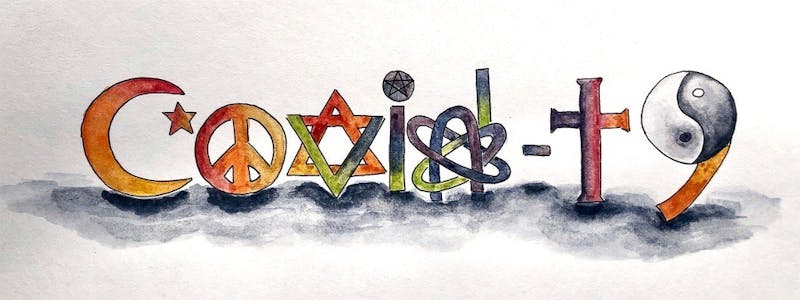
In the context of a national trend of decreasing religiosity among college students, COVID-19 has changed the way students — and society as a whole — can practice their faith.
Image By: Zoe Bendoff
In the context of a national trend of decreasing religiosity among college students, COVID-19 has changed the way students — and society as a whole — can practice their faith.
Image By: Zoe BendoffReligion provides many with faith and a source of community throughout life — especially in unprecedented times, some individuals turn to religion to develop a deeper understanding or a sense of guidance.
For many college students, this may still be the case, but others are a part of an increasing number of students who do not practice any sort of religion — the COVID-19 pandemic sheds light on the practice of religion on college campuses and, for some, the lack thereof.
Thirty-one percent of college students reported having no religious affiliations, an increase from 10 percent in 1986, according to a 2016 study by the Cooperative Institutional Research Program that surveyed 137,000 first-year students at 184 U.S. colleges and universities.
The study also noted the number of first-years who attend religious services is down to 69 percent, compared to 85 percent in 1986.
Finding faith on campus
Matthias Chan, a sophomore who grew up in a non-denominational Christian home but now identifies as Unitarian Universalist, said the extent to which college students are less religious practicing varies from person to person.
“It really depends on the individual and the type of worldview they were raised in,” Chan said. “I've seen many students become ‘less religious’ as in not following as strict standards as they were raised with. However, I've seen students become even more devout than what they were raised with growing up.”
At UW-Madison, students are encouraged to study and practice religion at any capacity they desire. Programs like the Religious Studies program and groups like Badger Catholic, UW Hillel, the Muslim Students Association and the Atheists, Humanists & Agnostics give students outlets to explore whatever they believe.
Ulrich Rosenhagen, professor and director of the UW-Madison Center for Religion and Global Citizenry, said while less students may be actively practicing religion, many are still interested in its role in our society.
He explained how he has noticed more and more students do not grow up practicing religion in their homes, but many students of all or no religious backgrounds take religious studies classes and participate in groups like the Interfaith Fellows to develop an understanding of religion.
The Interfaith Fellows encourages conversations and connections between students of all religious backgrounds while exploring undergraduates’ ties to religion.
“We are always part of a community that is bigger than ourselves,” Rosenhagen said. “Students learn how to maneuver this in a small campus situation, so they have a chance and an opportunity to learn with other students.”
Religious practices during a pandemic
While individuals across the world practice social distancing and isolation precautions, students’ exploration and exposure to religion have had to change.
Limits on large gatherings of people and reminders to avoid close contact have eliminated traditional ways of practicing religion as a community. Instead, religious groups utilize different internet platforms to continue spreading their message and encouraging the practice of their faith.
For groups like UW-Madison’s Badger Catholic, members can stay connected to their church by tuning into streamed Facebook and YouTube services. Followers can also watch an online speaker series and participate in other online spiritual development programs put on by the student organization.
Badger Catholic Marketing Director Bill Le, a junior at UW-Madison, has noticed how their community has maintained religious participation while in isolation through an increase in activity on their social media platforms.
“The whole Catholic community is trying to stay as connected and as relevant as possible,” Le said. “We’re having a lot more respondents at our events, but I don’t think that's because of a rise in religion. I think that’s because of a rise in people spending time on social media.”
Other organizations have adjusted in similar ways — the Interfaith Fellows have facilitated meetings over video chat to maintain connections and continue conversation during isolation.
For now religious communities must continue to practice their faith in nontraditional ways in order to prioritize health safety guidelines.
“Everyone should be very careful and should follow the advice scientists have given us which is social distancing and stay connected with your community, but virtually,” Rosenhagen said. “It’s something we all have to deal with, and we’re all in this together.”
Some religious groups have taken initiatives outside of their traditional religious practices and rituals to help the greater community in times of need.
“Religious communities, and to an extent, theological frameworks, offer a sense of support and comfort in these not-so-great times,” Chan said. “Religious communities offer both physical support — in the form of food and helping others get supplies they need — and emotional support, as I've seen religion offering a great sense of unity in times of trouble.”
Chan added the pandemic has highlighted both good and bad aspects of human nature.
“I'm sure you've seen the instances of racism towards Asians and greed in the act of hoarding, well, toilet paper,” he said. “But at the same time, it's brought out the compassionate side of humanity, and I've seen religious communities work on creating unique solutions to helping those affected by the pandemic.”
Some individuals have leaned on religion as a sign of hope during this time of uncertainty, Rosenhagen said.
“Faith and religious tradition helps you with transcending this situation and seeing something beyond this,” he said. “This is not the last word in the world we live in.”